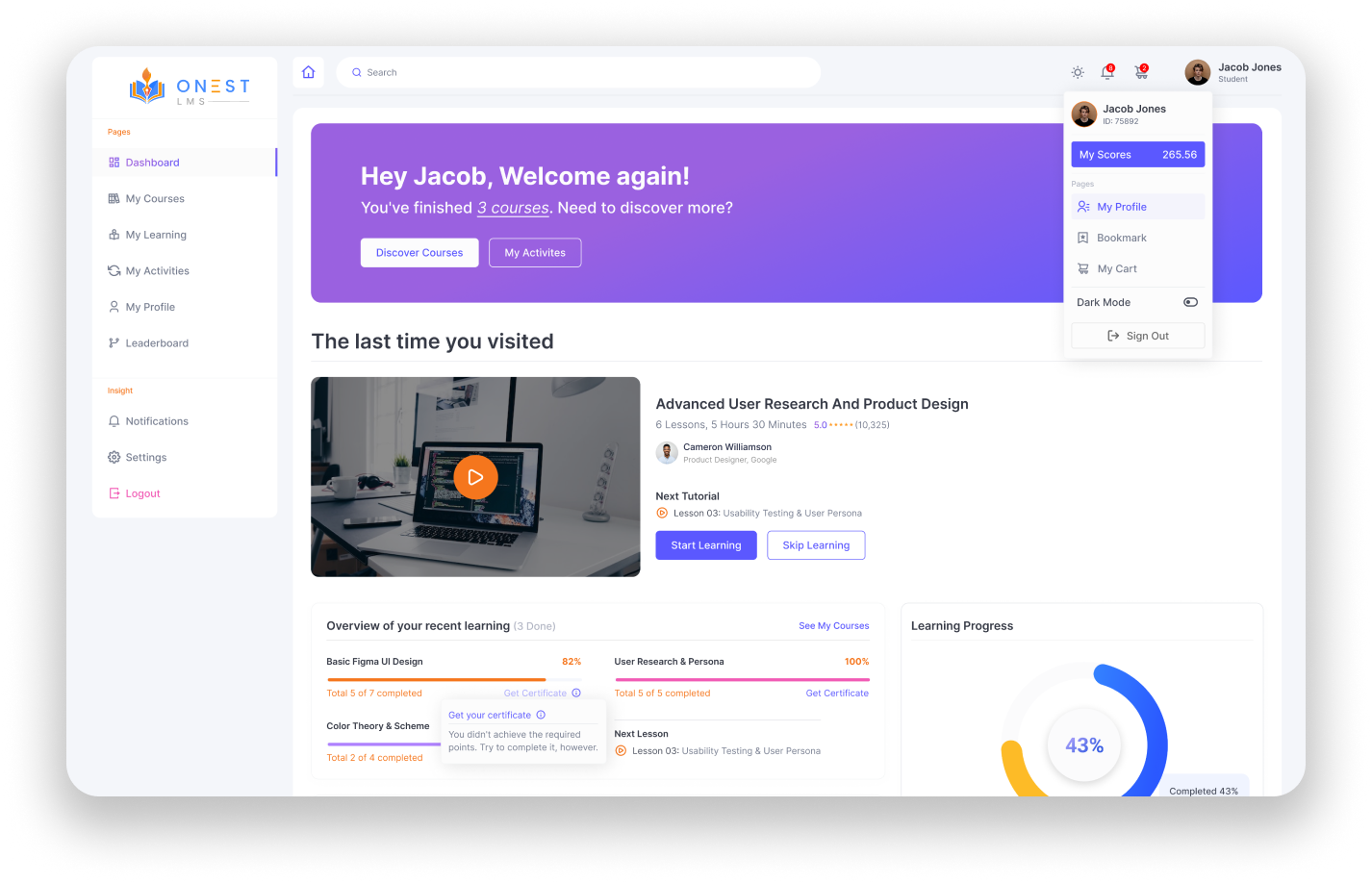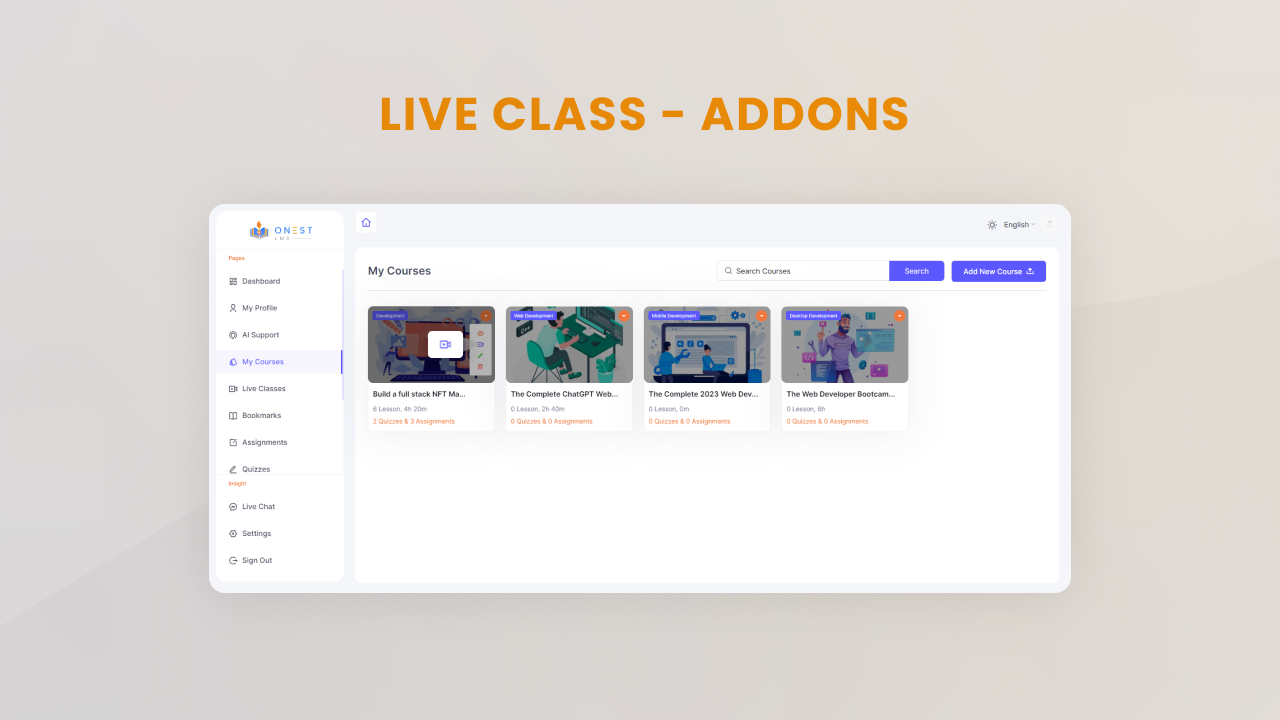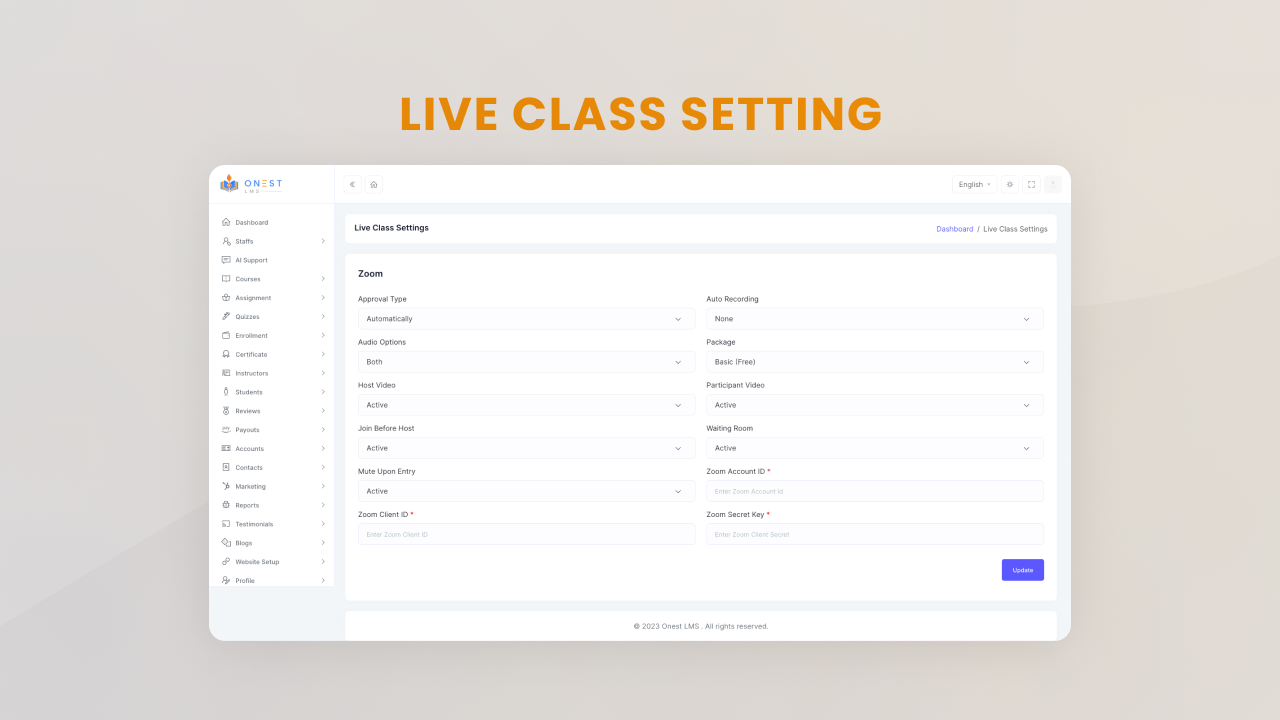Utilize Onest LMS to have fun, learn, and advance your career.
Our robust learning management system is the solution you're looking for.

Our robust learning management system is the solution you're looking for.

Create and manage online courses, including the addition of multimedia content such as videos, audio, and images.
Gamification elements such as points, badges, and leaderboards to increase engagement and motivation of the students.
Create and grade assessments, quizzes, and exams.
Generating reports and analytics on student performance, course completion rates, and other metrics.
Open chat rooms, wikis and discussion forums to establish further collaboration and communication with the students and teachers.
Reward system for teachers on the platform that are providing courses and educational content for the students to learn.
Chat with Us
Implemented
Team of dedicated experts
Easy to operate
These impressive features make our Learning Management Software the appropriate one for you.


















Students are able to track their progress through courses and assessments, including completion rates and grades.
Get Started
Enhance more features on Onest LMS with our addons.


The LiveClass module enables you to conduct interactive live classes and virtual learning sessions. Engage with your students in real-time through video conferencing, chat features, and collaborative tools for an immersive online learning experience.


The ZoomMeeting module seamlessly integrates with the popular Zoom platform to bring powerful virtual meeting capabilities to your application. Host and join video conferences, webinars, and online events with ease. Enjoy crystal-clear audio and high-definition video quality for seamless collaboration and communication.


The LiveChat module provides real-time chat functionality for seamless communication between users. Engage with your website visitors or enable user-to-user chat within your application. Powered by Laravel, this module offers a reliable and secure chat solution with WebSocket technology.


Two-factor authentication (2FA) is a security mechanism that adds an extra layer of protection to your online accounts and systems. It requires users to provide two different forms of identification or verification before granting access to their accounts.


lntroducing our extraordinary Forum Addon designed for the Onest LMS! Once seamlessly integrated into your LMS site, this addon creates a vibrant forum community, enriching the learning experience for all users. The frontend view becomes accessible at [your_domain_name]/forum, conveniently accompanied by a forum link in the footer's custom link column. To streamline forum management, administrators gain access to a dedicated "Forum Manage" tab in the admin section. Embrace this powerful addon and unlock the potential of engaging discussions and collaborative learning within your Onest LMS platform.





Provides tools for students to take assessments, quizzes, and exams, and receive instant feedback on their performance.
Get StartedSet up your account and have it verified within a few clicks.
Create and upload materials based on your field of expertise.
Enroll students and track their progress through courses and assessments.

Download our app and gain access to additional benefits.
Catch up with the latest
updates.
Acquire in-depth knowledge
about specific topics.
Enjoy and learn at the same
time.
App-exclusive contents and
much more!.

For any queries and concerns, do not hesitate to reach out to us via our business [email protected] We are available at all times to provide you with assistance.
A Learning Management System (LMS) is a software application or platform that facilitates the administration, delivery, and management of educational courses or training programs. It serves as a central hub for organizing, delivering, tracking, and assessing learning activities.
Common features of an LMS include:
LMS platforms are used by various entities, including educational institutions (schools, universities), corporate organizations, government agencies, and training providers. They serve as a central hub for delivering and managing online learning experiences.
Some key benefits of using an LMS include:
A: Yes, an LMS is designed to support various learning approaches. It can accommodate fully online e-learning courses, blended learning programs combining online and face-to-face elements, or even purely face-to-face courses by providing supplementary resources and assessments.
A: Factors to consider when selecting an LMS include:
A: Absolutely! LMS platforms are commonly used for employee training and development purposes within organizations. They provide a convenient and scalable way to deliver and track training programs, ensure compliance, and enhance employee skills and knowledge.
A: LMS platforms can be beneficial for organizations of all sizes. While larger organizations may require more extensive features and scalability, there are LMS options available that cater specifically to the needs of small and medium-sized businesses, with affordable pricing and simplified functionalities.
A: Yes, an LMS can support certifications and compliance training. It allows you to create courses or modules specifically designed for certification programs or compliance requirements. The LMS can track learners' progress, completion of specific modules, and assessments to ensure they meet the necessary criteria for certification or compliance.
A: Yes, many LMS platforms offer integration capabilities to connect with other software or systems. This allows for seamless data exchange and enhanced functionality. Common integrations include HR systems, content authoring tools, video conferencing platforms, CRM software, or payment gateways.
A: An LMS supports various types of learning materials, including:
A: Yes, tracking learner progress and performance is one of the core functionalities of an LMS. It can monitor various metrics, such as course completion rates, assessment scores, time spent on modules, or participation in discussions. This data helps instructors and administrators evaluate learner engagement, identify areas for improvement, and provide personalized support.
A: Yes, many LMS platforms offer customization options to match your organization's branding. You can typically modify the color schemes, add your logo, and customize the layout or design elements to create a cohesive visual identity.
A: Yes, an LMS can facilitate social learning and collaboration. It often includes features like discussion boards, chat functionality, or collaborative projects where learners can interact, share ideas, and collaborate on assignments or group projects.
A: Yes, an LMS can facilitate social learning and collaboration. It often includes features like discussion boards, chat functionality, or collaborative projects where learners can interact, share ideas, and collaborate on assignments or group projects.
A: An LMS generates reports and analytics on learner performance based on the tracked data. These reports provide insights into completion rates, assessment scores, engagement levels, and other metrics. Instructors and administrators can use this information to evaluate learner progress, identify areas of improvement, and make data-driven decisions to enhance the learning experience.
Social Login Module allows users to log in using their social media accounts. Create Your "Client Id" and "Client Secret" from developer area from a particular social site.